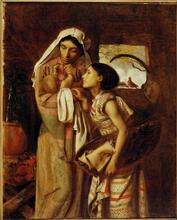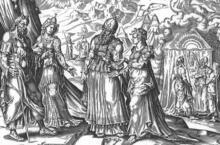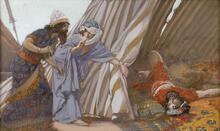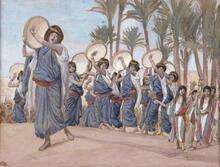Puah: Bible
Puah and Shifrah were the midwives who defied Pharoah’s orders that all male Hebrews be killed at birth. Pharoah does not punish the women for their defiance, and in fact, they seem to be rewarded by God for their actions. It is not clear whether the midwives were Egyptian or Israelite. It may be that they were overseers for Pharoah’s harem and held positions of honor.
Puah and Shiphrah Violate Pharaoh’s Command
The first chapter of Exodus relates that, as the Israelites in Egypt begin to proliferate following the death of Joseph, the Egyptian king seeks to curb the Israelite population, lest its numbers threaten the security of Egypt in time of war. When enslavement of the Israelites fails to achieve Pharaoh’s goal, he commands the Hebrew midwives, of whom only two are known by name—Shiphrah and Puah—to kill at birth all the male Hebrews, but to permit the females to live. Since, however, the midwives stand in awe of God, they violate Pharaoh’s command and permit the boys to live.
Called to account for failing to carry out Pharaoh’s order, Shiphrah and Puah report that the Hebrew women are more “vigorous” than Egyptian women and tend to deliver their babies before the arrival of the midwife. Convinced by the midwives’ explanation, Pharaoh does not punish them. Their explanation is probably accepted because of a universal human tendency to dehumanize victims—especially women—as a prelude to depriving them of basic civil rights, their reproductive freedom, their progeny, and ultimately their very lives.
The Midwives’ Identity
The identity of the midwives is somewhat ambiguous. The fact that they are given names is extraordinary, especially because other important female characters—Moses’ sister and mother, and Pharaoh’s daughter—are not named. The Hebrew text of Exod 1:15 supports either the view that Puah and Shiphrah were “Hebrew midwives” or the view that they were “midwives to the Hebrews.” As Egyptian women, their willingness to defy Pharaoh would be exceptional. It is more likely that they were Hebrews because both names are Semitic, not Egyptian.
Modern commentators have wondered how two midwives could have served a whole community, even if the figure of 600,000 men (Exod 12:37; cf. Num 1:46) is not taken literally. The obvious answer is that the text does not claim that Shiphrah and Puah were the only midwives to serve the Hebrews, but rather were two among many. Why then were they singled out? The tale implies that they are mentioned because of their virtue in fearing God more than they feared Pharaoh. In the Hebrew Bible, the phrase “fear God” can mean “obey God’s ethical imperatives” (see Lev 19:14; Job 28:28). It is noteworthy that Exod 1:1–2 in its highly schematic survey of Hebrew history from the descent of Jacob into Egypt until the birth of Moses, mentions by name only the midwives Shiphrah and Puah. The crucial role of the midwives in subverting Pharaoh’s decree is, perhaps, reflected in the Talmudic attribution of the redemption from Egypt to the merit of the virtuous women of that generation.
It is also possible that these two midwives were singled out because they held specific positions of honor. The Egyptian royal harems had women of different backgrounds, and Puah and Shiphrah were perhaps the head midwives or overseers of the harem. The evidence from ancient Egypt and the ancient Near East suggests that midwives were trained professionals and even religious practitioners, working in the liminal space between life and death. This would explain why Pharaoh spoke directly to them and why only two midwives are addressed.
The Midwives’ Reward
Because of their heroic acts, Shiphrah and Puah are rewarded by God with batim “houses.” The meaning of “houses” here is unclear. The most common interpretation is that the midwives are promised progeny. It is also possible that the woman are promised freedom from the “house” or royal harem of the Pharaoh. If this is the case, then God’s reward would be more about freedom than fertility.
The Hebrew term for “birth stool” in Exod 1:16, obnayim, means literally “two stones.” It may refer to the primitive form of the birth stool, which was simply two bricks (or stones) placed under each of the buttocks of the woman in labor. Such birth stools are depicted in the later forms of the hieroglyphic symbol for “birth” and are referred to in ancient Egyptian folk sayings, such as “He left me like a woman on the bricks.” Ancient Egyptian pictorial art shows that the two bricks were replaced by a chair with an opening in the middle (like a toilet seat) through which, with the help of gravity, the mother could push out her baby into the deft hands of the midwives.
Exum, J. Cheryl. “Second Thoughts about Secondary Characters: Women in Exodus 1:8–2:10.” In A Feminist Companion to Exodus to Deuteronomy, edited by Athalya Brenner, 75–87. Sheffield: Sheffield Academic Press, 1994.
Exum, J. Cheryl. “‘You Shall Let Every Daughter Live’: A Study of Exodus 1:8–2:10.” Semeia 28 (1983): 62–82.
Ghaliounghi, Paul. The House of Life: Per Ankh: Magic and Medical Science in Ancient Egypt, Revised edition. Amsterdam: B. M. Israel. 1973.
Janssen, Rosalind. “A New Reading of Shiphrah and Puah – Recovering Their Voices.” Feminist Theology 27 (2018): 9–25.
Meyers, Carol. “Birthstool.” Encyclopedia of the Bible and Its Reception, edited by Bernard McGinn et al. Volume 4: 64. Berlin: Walter de Gruyter, 2012.
Paul, Shalom M. “Exodus 1:21: ‘To Found a Family,’ a Biblical and Akkadian Idiom.” Maarav 8 (1992): 139–42.
Scurlock, Joan. “Baby-Snatching Demons, Restless Souls and the Dangers of Childbirth.” Incognita 2 (1991): 135–83.











